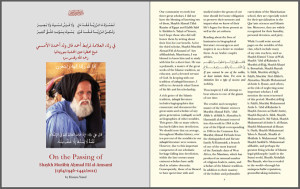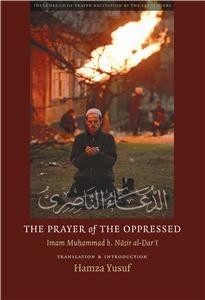Hamza Yusuf's Blog
May 10, 2021
The Sanctity of Sacred Spaces
All believers, and all people of decency irrespective of their faith (or lack thereof), should be concerned about the senseless violence yesterday at the Al-Aqsa mosque in Jerusalem. Certainly, Jewish, Christian, and Muslim religious leaders ought to raise their voices and condemn such violence while people are praying at houses of worship.
The month of Ramadan for Muslims serves as one of the most important means to getting close to God, and tranquility descends on worshippers praying and fasting, especially during the last 10 days of the sacred month. A believer, if accosted, is told to say, “I am fasting.”
That tranquility was brutally shattered at the Al-Aqsa mosque, the third holiest site for Muslims, while many Muslims were praying. A provocative incitement by Israeli extremists marching, coupled with the assault by Israeli forces at the mosque, caused a conflagration that resulted in hundreds of Palestinians hospitalized, and stun grenades landing inside the mosque where people were praying (further violence ensued elsewhere later with rockets and airstrikes). The people at the Sacred Precinct had no weapons. While some were seeking refuge in that sacred space, from all accounts most were simply observing their prayers in peace.
Empathizing with their plight should not be difficult. This is akin to an assault by government forces on the Church of the Holy Sepulchre during Midnight Mass on Christmas Eve, or on the Wailing Wall during Yom Kippur. If one of our sanctuaries is violated, then all of them are. For believers, this is surely a cause for alliance, for raising our voices in unison to protect the sanctity of sacred spaces.
The post The Sanctity of Sacred Spaces appeared first on Sandala.
May 4, 2021
Ramadan and Purification
Almost four centuries later another bard, Bob Marley, melodically reminded us, “Them belly full, but we hungry / A hungry mob is an angry mob.” We all know the primal nature of hunger; we have experienced the irritability that comes from missing breakfast or skipping our cup of morning coffee or tea. We hyperbolically talk of “starving” when a mealtime draws near. Our food trysts are now frequent every day in what sociologists refer to as “repeated food contacts” and farmers simply call grazing. At the drop of a hat, we indulge in lattes and biscotti. Many people no longer eat three “square” meals but rather graze all day, with Starbucks troughs sprouting up everywhere to ensure none suffer the pangs of hunger or the pain of caffeine withdrawal. In the lands of plenty in the West, we tend to forget that the abundance and easy accessibility of food was not always so and is not as widespread even now.Few of us who have the luxury of reading the daily paper over a cup of coffee and a piece of toast slathered with rich butter and marmalade have ever gone hungry intentionally, unless we succumbed to some ridiculous crash diet. But there was a time in the West when Lent, which commemorates Christ’s 40-day fast in the desert, meant fasting all day and eating one meal at night. As time passed that tradition devolved into a semi-fast and now means merely giving up something one really likes, such as chocolate.Even our portions of food and drink are much greater than what our grandparents had. In the midst of this cornucopia of consumption, millions of Muslims voluntarily abstain from food, drink, and sex during daylight hours in the month of Ramadan. They watch their co-workers eat and drink throughout the day, and occasionally have to apologize for not joining in due to their religious observance. Fasting for a month makes them aware of hunger as a palpable physical sensation, not a remote occurrence they read about in the newspaper. When the UN tells us that almost a billion people suffer from hunger and malnutrition and 25,000 people a day die from hunger, a faster appreciates these statistics in ways that remain distant to others.Ramadan fasting is not just about giving up food and drink. It’s about tending to “the better angels of our nature”. The Prophet Muhammad ﷺ said, “If one is not willing to give up bad behavior during his fast, God has no need for him to give up his food and drink.” Muslims are encouraged during this time to be better people, to treat others with more deference. If enticed to argue, the faster is advised to respond, “I am fasting.”There are many ways to be hungry. One can hunger for love, or fame, or social justice, but hunger for food seems to curb all other cravings. In being aware of others’ hunger, we contribute to a more empathic world. Perhaps, if, like Duke Senior, we responded to the cries of the myriad desperate Orlandos foraging in the forests of famine out there with hospitality and help, they might be coaxed into civility themselves. Certainly, hunger can bring out the worst in us, but it can also bring out the best.
The post Ramadan and Purification appeared first on Sandala.
March 1, 2021
On the Passing of Shaykh Murabit Ahmad Fal al-Amsami
 Download PDF
Download PDFThe post On the Passing of Shaykh Murabit Ahmad Fal al-Amsami appeared first on Sandala.
September 21, 2020
Sacred Text Messages
A New Podcast with Hamza Yusuf
In this age of material excess and spiritual privation, grounding ourselves in divine guidance has never been more critical. The Sacred Text Messages podcast with Hamza Yusuf provides an antidote to the modern madness by reconnecting us with God and His Messenger ﷺ. Listen to timeless wisdoms from sacred sources and rediscover Truth, Goodness, and Beauty.
Listen Now
or listen on one of the following
Spotify
Amazon Music
Stitcher
Captivate
The post Sacred Text Messages appeared first on Sandala.
March 22, 2020
A Wird During A Pandemic
During A Pandemic
English PDF
Arabic PDF
The post A Wird During A Pandemic appeared first on Sandala.
March 12, 2020
Fatwa on Congregations and COVID-19
for performing Congregational Rites in light of
the spread of COVID-19 (Coronavirus Disease)

The post Fatwa on Congregations and COVID-19 appeared first on Sandala.
January 20, 2020
Sir Roger The Gadfly
I first met Sir Roger Scruton (1944–2020) some years ago, at a conference on the pernicious effects of pornography. I presented a paper addressing the root cause of the plague ravaging societies worldwide: lust. When I finished, Sir Roger approached me, introduced himself, and said, “It’s very important that Muslims come to these events, as the Muslim voice of reason is too seldom heard.” It was the beginning of a wonderful relationship that led to Sir Roger penning powerful essays for Zaytuna College’s journal, Renovatio, on matters of faith and modernity. In the intervening years, we had many conversations, both public and private (including at my home). After each encounter, I felt edified and enriched.
Sir Roger earned well-deserved encomiums as an erudite polymath, a defender of freedom, and a reminder of the importance of beauty amid a civilization that relishes the repulsive. He saw himself as a member of an endangered species: the intellectual conservative. But his argument was clear: Most people, he believed, are conservative by nature, whether they know it or not; they understand the need to conserve the best from our inheritance. “A typical conservative,” he once told me, “is someone who looks around himself and he finds things that he loves, and he thinks those things are threatened, they’re vulnerable, and I’ve got to protect them.” He was talking about institutions that mediate our differences, the rule of law, and the classic works of art and literature, among other things.
In many ways, Sir Roger shared much in common with the philosophical founder of conservatism, Edmund Burke, a man he revered. Like Burke, an Irishman in the prejudiced English high society of the eighteenth century, Sir Roger was a working-class graduate of Oxford in a world of privileged elites. Later, he found himself in an academic environment disdainful of all things conservative. Burke was deeply concerned with England’s injustices in Ireland and India and worked to impeach Governor-General Warren Hastings for abuses against the Indian people; Sir Roger worked to end the abuses of the totalitarian states of the east and was a staunch advocate of religious freedom. But he was most like Burke in that he possessed a phenomenal intellect that enabled him to see what most others could not: where things are headed.
Religious freedom and secular law became keen interests of his. In an essay published last year, Sir Roger was critical of “Islamism” but praised Islam, saying that the Western notion of citizenship, even though it confined religion to the private sphere, was worth defending—“but only if we recognize the truth of which Islam reminds us: citizenship is not enough, and it will endure only if it is associated with meanings to which the rising generation can attach its hopes and its search for identity.”
He had studied Arabic so he could read the Qur’an. He appreciated the legacy of the intellectual giants of the Islamic tradition, including Avicenna, Ghazali, and Averroes, and knew well the history of Muslim civilization’s significant contributions to the West in science, philosophy, and literature. He also supported his son’s study of Arabic and Islamic civilization at Oxford. What troubled him about Islam also troubles most Muslims: What happened? Why does so much of the Muslim world currently live in failing states or despotic ones? These are legitimate questions, and asking them does not render one an Islamophobe, an accusation leveled at him. Moreover, Muslim radicalism in Europe, fanned by almost twenty years of war in the Middle East, does pose a serious concern for people of all faiths in Europe. These were topics he addressed honestly, civilly, and publicly. Always in his talks and books, he embodied the Arabic term adib, a word he knew well: “a learned gentleman.” As he came to know Zaytuna College and its mission of teaching the canons of two traditions—the Islamic and the Western—he said something that touched me: “Zaytuna is one of the points of hope in the world in which we live now.”
Sir Roger was more than a scholar isolated in an ivory tower: He entered the fray and the forum. He did not run from the battlefield; rather, he rallied the troops, sometimes at great risk to his personal safety. He supported and worked with dissidents behind the Iron Curtain, traveling to Poland, Hungary, and Czechoslovakia to give solace and intellectual aid to the victims of collectivism. He was a man whose vast range of knowledge, peerless perspicuity, and rhetorical prowess enabled him to produce a body of work in defense of common sense and sanity that will last long after the hollow op-eds and blogs of his detractors have dissipated into digital darkness.
Sir Roger was a constant gadfly cajoling us back to sanity. Socrates asked for free meals for the rest of his life for providing such a great service to Athens, and he was put to death; Sir Roger never asked for a free meal, but his character was nonetheless assassinated. Time will out the imposters and restore the men and women of truth to their proper place. The outpouring of love, support, and respect for Sir Roger Scruton following his death is sign enough for those who can see our culture has lost one of its greats. As a Muslim, in keeping with the Islamic tradition, I offer a Qur’anic verse for my departed friend: “We belong to God alone, and to God we return.”
Image Source: https://www.thetimes.co.uk/article/si...
The post Sir Roger The Gadfly appeared first on Sandala.
September 13, 2019
Don’t Curse the People of Syria
It is recorded in al-Mustadrak ‘ala al-Sahihayn that the Prophet Muhammad, peace and blessings be upon him, said:
«…لا تَسُبُّوا أَهْلَ الشَّامِ»
المستدرك على الصحيحين
“Never curse the people of al-Shām…”
al-Mustadrak ‘ala al-Sahihayn
RESOURCES
Introduction to The Prayer of the Oppressed (PDF)
Blog Post: A Reflection on Divine Love
The post Don’t Curse the People of Syria appeared first on Sandala.
September 12, 2019
The Prayer of the Oppressed – An Introduction

Introduction – The Prayer of the Oppressed
The post The Prayer of the Oppressed – An Introduction appeared first on Sandala.
May 30, 2017
Terror on a Train
Courage is the first and the foundation of the moral virtues. It is a quality that the ancients most admired in men and a quality that appears to be in decline in our modern world. But every once in a while, a sublime act of courage occurs, and, in spite of ourselves, it resonates deep within us, and we are overwhelmed with admiration for a quality that we recognize as something that transcends the mundanity of modern life.
Last Friday afternoon, when two young teenage girls (one of them wearing a headscarf) were being verbally abused by a monster in human form, three onlookers chose not to look away and instead came to the girls’ aid. Unexpectedly, the aggressor did something beyond our ken: he stabbed two of them to death and grievously injured the third man.
His hideous act brought to life awareness in all of us of a quality that is sorely in need of revival in our hate-filled times. When faced with hatred—whether it comes from a bigot, Muslim, Christian, Jew, Hindu, Buddhist, secularist, or atheist—we need to stand up to it, speak out against it, and publicly condemn it, until it becomes a deterrent to those who, even for a moment, think of expressing their hate. We can do that only by spreading the light of courage, prudence, temperance, and justice—qualities the ancients considered to be the highest moral potential that each of us actualizes.
Just as most Americans disavow that supremacist bigot’s ideology and know that it does not represent their beliefs, so too the vast majority of Muslims, who are peace loving and law-abiding people, disavow the Islamist extremists’ ideology and know that it has nothing to do with their beliefs. Collectivizing the sins of some on all is what led to the deaths of those two courageous men and the injury of the third man. And that is the ideology that we all must fight within ourselves—that we do not take the individual actions of anyone to represent the actions of everyone, no matter the group they may be from, unless they are their stated beliefs.
The media’s double-standard is perhaps more glaringly obvious than usual in this particular tragic event: we must ask ourselves, instead of “Jeremy Christian,” had the horrific aggressor had a name like “Abdullah Muslim,” and had those two girls been dressed differently and been of a different skin color, in the very same scenario, instead of viewing the murderer as a “psychopath,” would we now be looking at an incident of “terrorism” in which many of us would be collectively blaming all Muslims, just as Jeremy Christian blamed those two innocent girls for the acts of a monstrous minority?
When tragedy like this happens, it demands reflection in order to penetrate the meanings or to allow the meanings to penetrate us. Aeschylus, the great Greek tragedian, who understood the human heart, wrote,
Even in our sleep, pain which cannot forget
Falls drop by drop upon the heart,
Until in our despair, against our will,
Comes wisdom through the awful grace of God.
Tragedy acquires meaning and consequence only if we learn from it. And what we must learn from this tragic event in Portland is that the best of America came up against the worst of America on that train. And even though the best died, in their death, there has to be a collective affirmation from all of us that the America of Jeremy Joseph Christian is not the America that we want. Instead, we must resolve to nurture the America of the three courageous men who put their lives on the line. The America we celebrate is that of Taliesin Myrddin Namkai-Meche, Ricky John Best, and Micah David-Cole Fletcher—the America that protects the vulnerable not the one that preys on them like a quarry. May we as Americans acquire the wisdom that comes through the awful grace of God.
Taliesin Namkai-Meche’s mother embraced a Muslim girl at the vigil for her son.
Taliesin’s family released this statement on Saturday afternoon:
“Taliesin Myrddin lived a joyous and full life. His enthusiasm was infectious. We lost him in a senseless act that brought close to home the insidious rift of prejudice and intolerance that is too familiar, too common. He was resolute in his conduct (and) respect of all people. In his final act of bravery, he held true to what he believed is the way forward. He will live in our hearts forever as the just, brave, loving, hilarious and beautiful soul he was. We ask that in honor of his memory, we use this tragedy as an opportunity for reflection and change. We choose love. Safe journey Taliesin. We love you.”
The post Terror on a Train appeared first on Sandala.
Hamza Yusuf's Blog
- Hamza Yusuf's profile
- 941 followers





